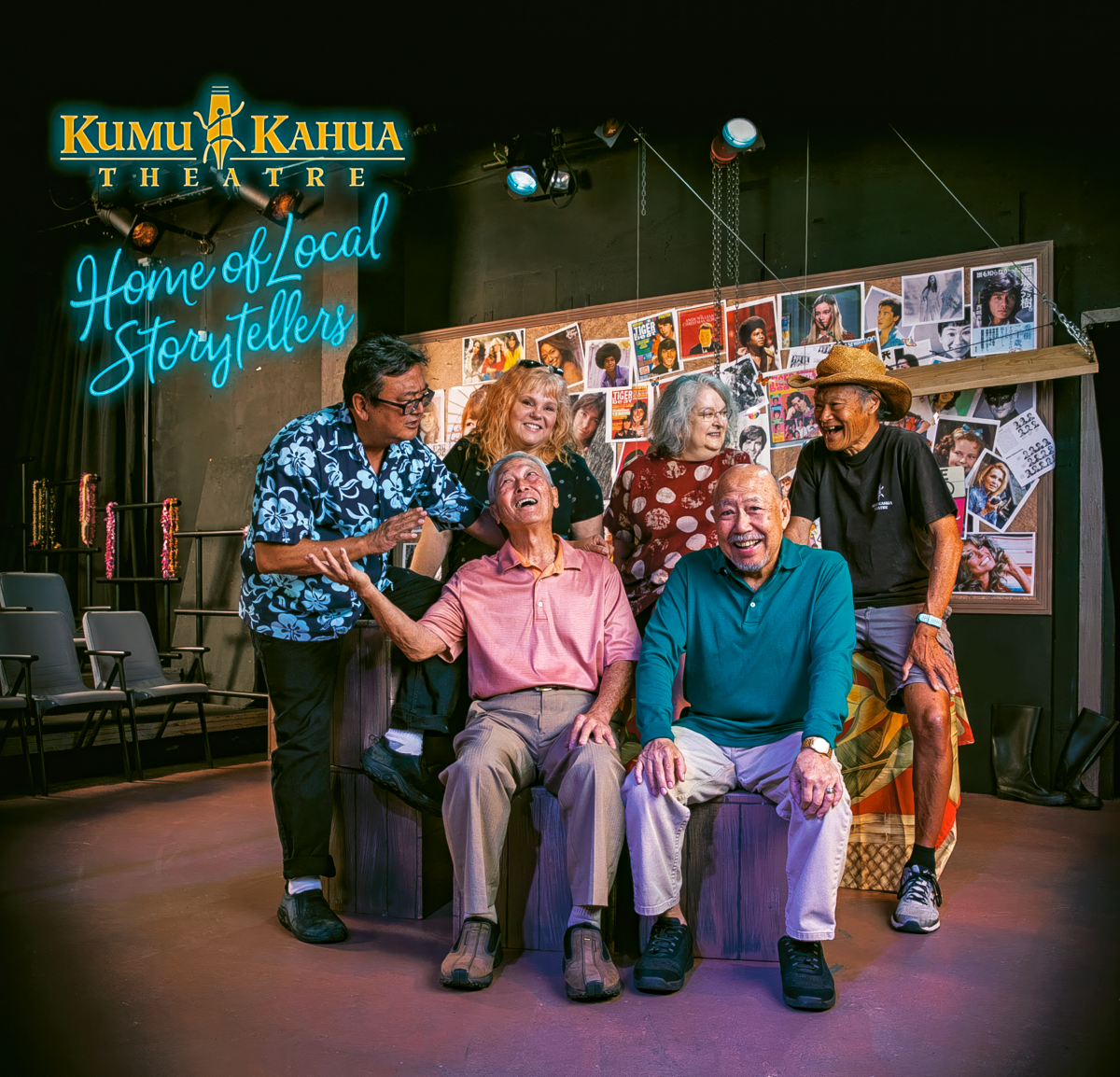
Permanently housed in a black box venue in the historic Kamehameha V Post Office Building at the corner of Bethel and Merchant streets in Honolulu, the theatre known to locals as “Kumu” has a special place in the hearts of many theatre lovers in the state.
That’s because it’s the only theatre on the island focused exclusively on stories that involve the experience of locals in Hawai‘i.
Other theatres, like Diamond Head Theatre or Manoa Valley Theatre, more often stage shows written off island, bringing works including Broadway musicals, well-known Shakespearian plays and contemporary favorites to O‘ahu. These are key niches, albeit different from the locally-oriented mission of Kumu Kahua Theatre.
Allan Okubo and Dann Seki have performed on stages across O’ahu. But they’ve been a part of Kumu Kahua since before it found this permanent home, back then it was more of a fledgling troupe performing anywhere its players could find a stage — and an audience.
At times, these two local actors seem to embody the longtime mission of Kumu Kahua: To create local theatre to tell truthful local stories, written and performed on stage by local people for an audience of Hawai‘i residents. The stories are selected each season by artistic director Harry Wong III to celebrate or challenge the community — sometimes both, he says.
But the characters are always rooted in Hawai’i, in the experiences of those who have deep ties to the Pacific.
“It’s fun to do because you’re often really doing what you did anyway,” Dann says, smiling. “The character is somebody that you know. Either you were that person or you know somebody who is like that person.”
There’s a reason why it’s easy for actors and audiences alike to relate to the stories performed at 46 Merchant Street.
Nearly every play at Kumu Kahua is written by a playwright who has strong ties to Hawai‘i — like Ed Sakamoto, a prolific writer who grew up in Hawai‘i and was in 1997 the recipient of the Hawai‘i Award for Literature, the state’s highest award for a writer. While Sakamoto lived in Los Angeles for decades after graduating from UH Mānoa, his work is grounded in his island upbringing.
Other popular writers whose work is often performed at Kumu Kahua include former newspaper columnist Lee Cataluna, whose humorous yet insightful shows include Da Mayah and Folks You Meet In Longs, the latter of which will run from May 25 – June 25 to close this season at Kumu Kahua. This is the 52nd season of shows performed by the theatre.
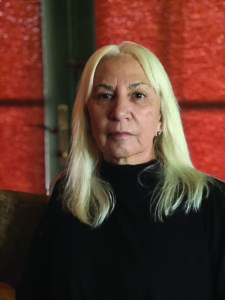
Victoria Nalani Kneubuhl, who grew up in Mānoa Valley and is both Hawaiian and Samoan, saw the first play she penned performed on stage at Kumu Kahua
in 1986. Although her uncle was also a playwright, her foray into theatre happened a bit by accident when she was a mother of two recently returning to university life. Looking one semester for a creative writing course, she happened upon an open spot in a playwriting course. After seeing her work on stage — and performing in a few shows herself — she took additional writing courses, joined the board of Kumu Kahua Theatre, and went on to win the 1994 Hawai’i Award for Literature.
“When I started writing I really felt like I wanted to write about who I was and where I came from,” the 73-year-old writer said. “I wasn’t interested in going to New York or anything like that, not at all. I was interested in local Hawaiian history and culture.”
Victoria is known for plays that feature mystical imagery, mesmerizing dialogue, and inspired weaving of contemporary and historical themes. She often mixes storytelling methods and thus can leave audiences deeply impacted by the complexity and artistry of her works.
 One of her recently written plays, Aitu Fafine, will be included in Kumu Kahua’s 53rd season. The title means Ghost Woman in Samoan, and is one of several plays in her forthcoming book, Navigating Islands: Plays from the Pacific. It will be published by UH Press.
One of her recently written plays, Aitu Fafine, will be included in Kumu Kahua’s 53rd season. The title means Ghost Woman in Samoan, and is one of several plays in her forthcoming book, Navigating Islands: Plays from the Pacific. It will be published by UH Press.
Seeing her plays performed on stage, coupled with realizing that she is part of a cadre of storytellers crafting stories set in the Pacific has inspired Victoria to keep writing. Over the years, she’s seen developments she never thought possible, from entire college courses focused on Pacific Literature to whole plays performed in ‘ōlelo Hawai‘i. “It’s wonderfully astounding.”
“When I started writing in the ’80s, if you had told me that was going to happen, I never would have believed you,” she said.
Staging plays written for and about life in the Pacific is also made easier by easy access to actors who can speak not only ‘ōlelo Hawai‘i but also pidgin English — like Dann Seki and Allan Okubo.
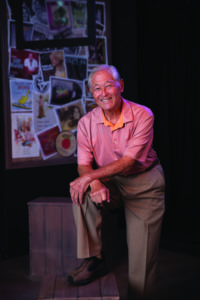 “Eh, dos buggahs look familya”
“Eh, dos buggahs look familya”
You know you’ve seen them before, but you’re not sure where. There’s an air of familiarity, but you just can’t place them. It’s almost familial. If these two guys aren’t your uncle, they’ve probably played him on TV.
Coulda been in a movie, too. Or maybe somewhere on stage, at that show you saw last year.
Yes, that’s where you know them from. But with his warm smile and sparkling eyes, you might first recognize Dann Seki as a sushi chef — he played one in a local TV ad in the 1990s, furiously chopping fish and dishing out sushi on a conveyor belt moving hilariously fast. You may also know him as a local doctor from Five-O. Or was it Magnum P.I. where you saw him? It also could’ve been on Doogie Kamealoha. Or, hang on, wasn’t he the Old Man in Baywatch Hawai’i?
Yes, he’s played all those guys. A youthful 77 years old, he’s also appeared on stage around Honolulu in more than 40 plays.
“A lot of times after a show, audience members will come up and say something to me like, ‘Hey! You remind me of my Uncle Teddy, he was just like that guy you played,” Dann chuckles. “I always think, ‘That’s so nice,’ and say thanks. Then I think to myself, ‘I sure hope Uncle Teddy is gonna be OK with that!’”
One of Dann’s longtime pals, Allan Okubo, can relate. Now 75, the retired local attorney has been appearing on Hawai‘i-based television shows since the Vietnam era. With a winning grin and an amazingly expressive face, he got his start in acting working as an extra on the set of the original Hawai‘i 5-0 to make pocket money while studying political science at UH Mānoa. Much of the time, he was simply told to bring his white ambulance driver and come to the set.
“Back then you just call up the studio and say, ‘Can I be an extra?’ And they just sign you up, take your picture,” he said. “That was my part-time job my last year-and-a-half of college because I was working every other week pretty much.”
You might also recognize Allan as the friendly grandfather from television commercials advertising anything from Foodland to Aulani-Disney Hotel & Resort and Hawaiian Telcom.
Both graduates of Hawai’i public high schools, Dann and Allan met each other as undergraduates at UH Mānoa during ROTC training. Back then, they were acquaintances; they didn’t know they’d later appear frequently on stage together, most frequently at Kumu Kahua Theatre.
Neither was involved in theatre during high school nor did they focus their collegiate studies on acting. Rather, both were focused on staying enrolled as students — and staying out of the draft.
After graduation, the two men each embarked on their own career; Dann was an audiologist who started his family while stationed at Fort Knox during military service and Allan settled down with a wife and children while busy with his law practice in Hawai’i.
Now septuagenarians, Dann and Allan have also acted in more than 75 plays on O’ahu. They’ve starred opposite each other in several popular local plays — like Aloha Las Vegas, one of the most popular plays in Kumu Kahua history — numerous times over the years. By now, they say, playing off each other is a breeze.
“Dann and I, we’ve been working together for so long it’s like riding a bicycle,” Allan says. “It’s just really comfortable. I can play off of him and he can play off of me. It’s just like we can do it without acting, just being us.”
Theatre work doesn’t pay them — all theatres in Honolulu operate with volunteer actors — but both these Japanese American locals say they love the opportunity theatre affords them to pretend to be someone else for a little while. To consider other points of view, other life experiences.
“For two or three hours you get to be somebody else. It allows you to do some stuff you might not otherwise do,” Dann said. “That’s fun.”
Then there’s the instantaneous feedback of live theatre. Those pearls of live laughter. Collective gasps. Focused contemplative silences filling the theatre.
Both men acted in their first live play with Kumu Kahua Theatre, though not at the same time — and not at the same place. Prior to 1994, the troupe was known as an itinerant theatre; it performed wherever there was space to set up a play and a few audience seats.
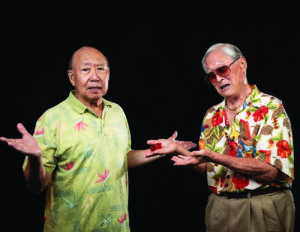
More than two decades later, both men can clearly recall the magic of performing in a live theatre, facing a local audience after weeks of practicing intensely after work. Neither of the two men performed in front of a live audience until they were married fathers with careers.
“It was a total learning experience,” Dann Seki remembers of his first show, Mānoa Valley, in 1989. He played Tosh Kamiya, one of the lead characters in this middle episode of Ed Sakimoto’s Hawai‘i No Ka Oi trilogy. He auditioned for the role after seeing a call for auditions in the newspaper.
“The experience was everything I wanted it to be. I’d always wanted to try theatre, since high school, but I never got the chance. It was kind of scary, because the role of Tosh is actually one of the lead roles in the play. It was scary to step into your first play in a fairly large role; I would’ve been happy just to be a butler bringing coffee out on stage.
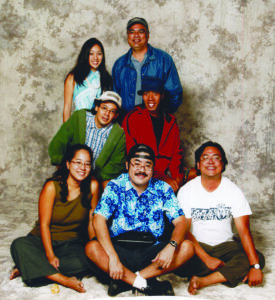
“So it was scary but I would say it was liberating. I think all the shows I’ve done since then are the same.”
Dann’s first show was performed at a school cafeteria, where members of the cast were also charged with moving cafeteria tables and setting up the play’s set each evening before the performance. After the play finished and the audience left, the actors would convert the room back to a cafeteria.
“In retrospect, that was a hellofa lot of work. But that was my first experience in theatre. I thought, ‘This was how it is.’”
Allan Okubo’s first play, another show written by Sakamoto, also saw him in a major role — and with a unique window into the world of playwriting and directing.
The play, called Pilgrimage, featured a few scenes involving complex karate movements. This was perfect for Allan, a karate instructor himself. He played the role of a junior student, opposite an actor cast as a senior instructor. But this older actor lacked karate skills, creating a challenge for the production team.
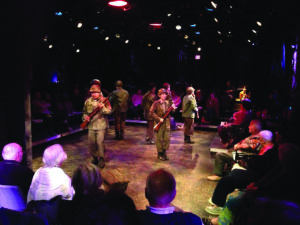
Director Jim Nakamoto spoke to Allan; the two came up with a solution. They phoned Sakamoto, the writer, and asked him to rework the scenes so that the senior instructor would advise Allan’s character as he performed the kata. This allowed the senior actor to focus on his role without the burden of performing complex karate movements. That task fell, happily, to Allan.
The result was a successful production that showcased Allan’s talents — and highlighted the importance of local actors with deep ties to the myriad cultures present in Hawai‘i.
“Jim comes to me and says, ‘Can you teach him that?’” Allan remembers. “I said it would take me two months to get him to look like he can even know what he’s supposed to do and then a year before he looks like he’s an instructor.”
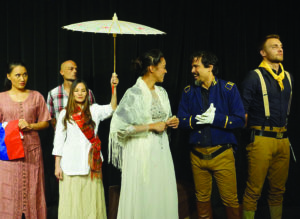
For more than 20 years, both Allan and Dann have remained deeply committed to performing shows with Kumu Kahua — even as they’ve continued with television, radio and movie work. Each also performs at other theatres around O‘ahu.
Kumu Kahua occupies a unique space not only in the local artistic milieu but also nationwide. It is one of only a few — if perhaps the only — theatre dedicated entirely to place-based theater.
Keeping Kumu Kahua Going
The actors who perform at Kumu Kahua, all unpaid, are also locals. Some playwrights and performers have years of experience; others are new to the theatre. All are welcome.
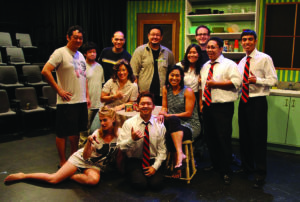
“Everyone has a story within them and the stories within the people of Hawai‘i are very important. That is why we exist,” says Donna Blanchard, longtime managing director at Kumu Kahua.
“Year after year we have full seasons of shows devoted to the people who are of the place where our theatre is located,” she noted. Blanchard has worked with artistic director Harry Wong III since she began working at Kumu Kahua in 2012.
“This is what I always wanted to do, work in a theatre solely devoted to the people within its geographic footprint.”
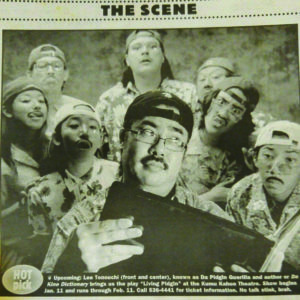
Donna, originally from Northwest Indiana, moved to Hawai‘i in late 2011 to help develop the theatre’s board of directors. The board was originally comprised of mainly creative professionals and academics — including the theatre’s founder, Dennis Carroll — who were always bursting with artistic energy. Slowly, the board has progressed to one with greater business acumen, experienced in the day-to-day financial management of a professional theatre.
“As any arts organization matures, ideally that board will evolve into more of a business board with people who are able to help support the organization and also people who are able to help support the creative directors of the organization,” she said.
Donna, who managed a theatre in Valparaiso, Indiana, is herself an award-winning actor who was searching for an opportunity to work at a theatre telling local stories.
“I wanted to work with a brick-and-mortar theatre that practices ‘theatre of place,’” she said. “No other theatre in the United States was doing whole seasons of this kind of work, at least not at that time.”
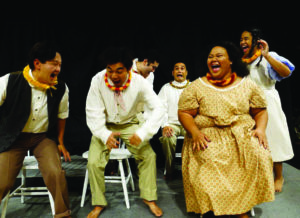
Even before Blanchard’s arrival, Kumu Kahua was holding both playwriting and acting classes, charging nominal fees. The theatre also worked with Bamboo Ridge Press to hold monthly writing contests, challenging anyone with a Hawai’i story to submit snippets of work written for the stage.
Victoria herself has taught some of the writing classes, as has Cataluna. The most recent course was taught by Lee Tonouchi, a local writer whose show Gone Feeshing was performed this season.
“I’m so amazed at some of the younger people in my class,” Kneubuhl said. “Oftentimes the things that concern them are things that are super thoughtful. To see what younger people are thinking about and doing is so valuable and touching.”
While Kumu Kahua has long held these regular classes and workshops, Donna said, these classes have recently become free to join. That’s thanks to COVID-19 — sort of.
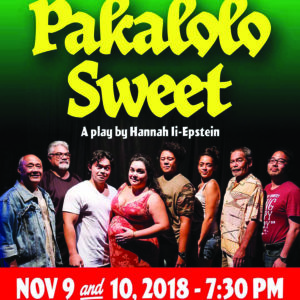
The theatre was able to secure a COVID-19 Economic Injury Disaster Loan, or EIDL, that became the basis for shoring up Kumu Kahua’s educational mission.
“We’ve determined that by educating our artists, that’s how we can help grow our programs and our future,” Donna said.
For information about upcoming classes, visit the theatre’s website.
Intro To Kumu Kahua
Kumu Kahua has always been about growth — both of individual artists and the Hawai‘i theatre scene.
It started in the spring of 1971, the brainchild of the UH Mānoa professor Dennis Carroll and a cadre of committed graduate students. Hailing from Australia, Dennis recognized the influences of colonialism and other unique threads of Hawai‘i’s societal fabric and launched the theatre along with eight graduate students.
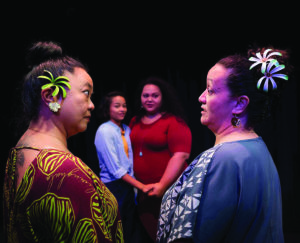
“He had an incredible amount of energy,” Victoria remembers. “He was incredibly smart. I took my second playwriting class from him. He had so much passion and love for the theatre it was infectious. “He was so dynamic.”
Dennis was known to be edgy in the classroom and out of it. The theatre troupe he formed always focused not only on place-based theatre but also the avant-garde. Dennis, who went on to eventually head the theatre department at UH Mānoa, was always interested in stories rife with social awareness and themes that could prompt social change. He remained involved with Kumu Kahua until his death in November 2021.
“Kumu wouldn’t exist without Dennis Carroll,” said Elizabeth Wichmann-Walczak, herself a retired UH theatre professor and director.
“Maybe something like it would, but I don’t know. In the history of Kumu there’s a large swath where we didn’t have funding or that black box theatre. We couldn’t rely on either of those things. But Dennis just held it together and kept creating. He drew people in to work on it.”
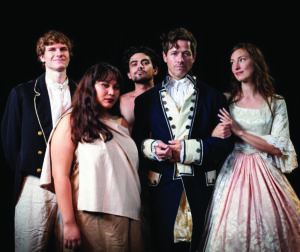
Work was a big part of keeping Kumu Kahua Theatre afloat in its early days. Early board members and other volunteers, including Elizabeth, remember doing everything from taking ticket orders off an answering machine kept in the garage of another board member’s home. There were props to find, costumes to source, sets to be designed, actors to be recruited. The work never really ended.
Plays were performed wherever there was space, including temporary World War II structures on the campus of UH Mānoa. The show would always go on, somehow.
Stories Within Them
The writers and actors who have long been a part of Kumu Kahua Theatre have taken different paths to get there.
Allan Okubo took his first acting class during his last year as a political science major at UH Mānoa — because the course description stated clearly: No exams, no papers.
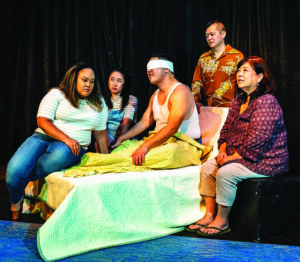
“I called them up and I said, ‘Is this true? No exams and no papers? He says yes. So I said, ‘OK, sign me up.”
Everything was going according to plan until the professor, Glen Cannon, assigned all the students to return to the second class prepared to sing a song. Allan thought, ‘Oh, my gosh. Can I quit now? What do I do?’
He spent a week leafing through records until he found a song called Little Curly Hair in a High Chair, originally recorded by Fats Waller. He came to class and sang it in a humorous rendition of a warbled toddler’s voice. When he finished, he looked over and saw the professor laughing.
“I said, “OK, maybe I survived.”
Allan, who today mentors younger actors, says he loves acting because it gives him a chance to take on another persona. On his own, he says, he’s always been very shy and quiet. Once upon a time, during mandatory ROTC training back in his days at McKinley High School, he recalls, he got so nervous he forgot his own name when he was meant to stand at attention and salute.
“I stood there saluting, and I was supposed to say my name. I thought, ‘Oh no, I had a name when I came in here. What is my name,’” he chuckles.
Allan’s trick to get rid of the anxieties that can come along with public speaking is to simply stay in character. That way, he notes, it’s never him who is making a fool of himself — it’s his character.
Considering the experiences of different kinds of people — different characters — had kept Allan young and open-minded. The same is true of his pal Dann Seki.
Dann’s aptitude in science originally kept him away from acting until he was a busy working parent — despite a longtime curiosity about theatre. He even spoke to his college guidance counselor about theatre after his sophomore year at UH Mānoa. The two sat down to see about helping Dann come up with a major.
“We talked for a while and he said what are you into? I said I’m interested in speech and drama. He looked at me like, ‘What the hell are you gonna do with that? Teach drama in high school?’”
The counselor looked over Dann’s aptitude test, which indicated he’d do well in the sciences. Dann told him that the biology courses he’d taken at UH hadn’t really sparked his interest. So the counselor leafed through the catalog. After a while, he said he noticed a department called Speech Pathology.
“He told me, ‘I don’t know much about it, maybe you go talk to that department and see what they can give you.”
Two years later, Dann found himself with a degree in audiology and a job as an audiologist with the army.
“I went back to see my advisor and said, “Just so you know, Speech Pathology is mostly science, right? It’s like, physiology. Vocal systems of the mouth. Nothing to do with drama.’ He just looked at me and said ‘Oh ok, good to know good to know.’”
An Evolving Story
As longtime actors in Hawai‘i, Dann Seki and Allan Okubo have experienced the joy and camaraderie of the local theater community firsthand. They are also keenly aware of the challenges facing older actors — like fewer roles — so they and others have taken it upon themselves to advocate for more roles for people their age.
With humor and persistence, they have been urging local playwrights to consider adding an extra grandfather or older man into their new stories.
Theatre provides the duo opportunities to learn new things off-stage, too. Dann, for example, is a board member at Kumu Kahua, and also recently became involved in sourcing props. The theatre is always looking for behind-the-scenes volunteers.
“Theatre is the place for us to exercise our shared humanity,” Donna Blanchard said. “We want to bring everyone in the community closer to the work we are doing, to help everyone recognize the importance of their voice. We’re a place to exercise that voice.”
Get Involved
If auditioning for a play seems daunting, don’t forget that enjoying theatre can be as simple as attending a play itself.
“Leave your home, shut off your phone, sit next to strangers and experience something together,” Henry Wong III said. “This is a place people can come and see themselves represented, their struggles and their stories — maybe represented in new ways.”
KUMU KAHUA THEATRE (501(c) 3 nonprofit)
46 Merchant Street, Honolulu, HI 96813
Box Office: 808-536-4441 | Admin. Office: 808-536-4222
officemanager@kumukahua.org
facebook.com/kumukahuatheatre | @KumuKahua
kumukahua.org

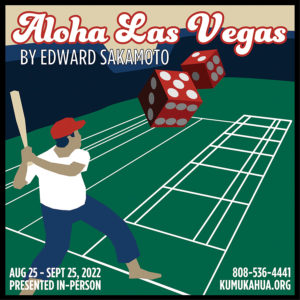

Leave a Reply